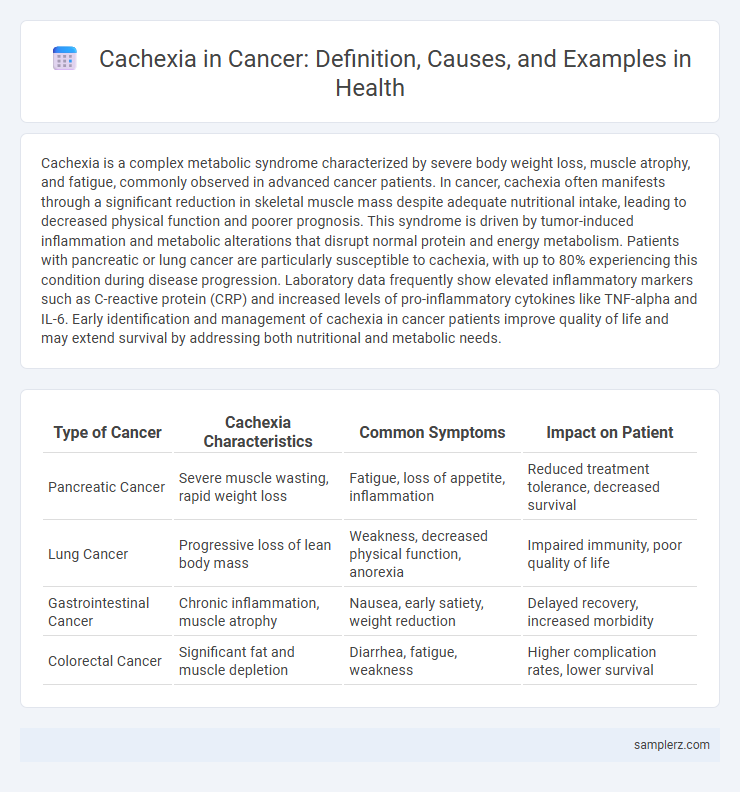Cachexia is a complex metabolic syndrome characterized by severe body weight loss, muscle atrophy, and fatigue, commonly observed in advanced cancer patients. In cancer, cachexia often manifests through a significant reduction in skeletal muscle mass despite adequate nutritional intake, leading to decreased physical function and poorer prognosis. This syndrome is driven by tumor-induced inflammation and metabolic alterations that disrupt normal protein and energy metabolism. Patients with pancreatic or lung cancer are particularly susceptible to cachexia, with up to 80% experiencing this condition during disease progression. Laboratory data frequently show elevated inflammatory markers such as C-reactive protein (CRP) and increased levels of pro-inflammatory cytokines like TNF-alpha and IL-6. Early identification and management of cachexia in cancer patients improve quality of life and may extend survival by addressing both nutritional and metabolic needs.
Table of Comparison
| Type of Cancer | Cachexia Characteristics | Common Symptoms | Impact on Patient |
|---|---|---|---|
| Pancreatic Cancer | Severe muscle wasting, rapid weight loss | Fatigue, loss of appetite, inflammation | Reduced treatment tolerance, decreased survival |
| Lung Cancer | Progressive loss of lean body mass | Weakness, decreased physical function, anorexia | Impaired immunity, poor quality of life |
| Gastrointestinal Cancer | Chronic inflammation, muscle atrophy | Nausea, early satiety, weight reduction | Delayed recovery, increased morbidity |
| Colorectal Cancer | Significant fat and muscle depletion | Diarrhea, fatigue, weakness | Higher complication rates, lower survival |
Understanding Cancer-Related Cachexia
Cancer-related cachexia manifests as severe muscle wasting and weight loss in patients with advanced malignancies such as pancreatic and lung cancer. This multifactorial syndrome involves metabolic alterations, systemic inflammation, and reduced appetite, significantly impairing treatment outcomes and quality of life. Understanding the underlying mechanisms of cachexia is critical for developing targeted therapies to improve patient prognosis and survival rates.
Common Cancers Associated with Cachexia
Cachexia is frequently observed in advanced stages of pancreatic, lung, and gastric cancers, where it significantly contributes to weight loss and muscle wasting. This syndrome affects up to 80% of patients with pancreatic cancer, making it a major cause of morbidity and mortality in this population. Understanding the prevalence of cachexia in these common cancers is crucial for improving nutritional and therapeutic interventions.
Clinical Features of Cachexia in Cancer Patients
Cachexia in cancer patients is characterized by severe weight loss, muscle atrophy, fatigue, and anorexia, often despite adequate nutritional intake. Clinical features include systemic inflammation, elevated pro-inflammatory cytokines such as TNF-a, IL-6, and alterations in metabolism leading to increased energy expenditure. This syndrome negatively impacts physical function, response to cancer treatment, and overall survival rates.
Pathophysiology of Cancer-Induced Cachexia
Cancer-induced cachexia involves complex pathophysiological mechanisms characterized by systemic inflammation, metabolic alterations, and muscle protein degradation. Pro-inflammatory cytokines such as tumor necrosis factor-alpha (TNF-a), interleukin-6 (IL-6), and interferon-gamma (IFN-g) promote proteolysis and inhibit muscle synthesis, leading to severe weight loss and muscle wasting. Mitochondrial dysfunction and altered energy metabolism further exacerbate tissue catabolism, impairing patient mobility and quality of life.
Case Study: Cachexia in Advanced Lung Cancer
Advanced lung cancer frequently triggers cachexia, characterized by severe weight loss, muscle wasting, and systemic inflammation. A case study revealed a 65-year-old patient with non-small cell lung cancer experiencing a 15% body weight reduction over three months, accompanied by decreased appetite and profound fatigue. These symptoms highlight the crucial need for early nutritional intervention and multimodal treatment strategies to improve patient outcomes in cachexia management.
Cachexia Manifestation in Pancreatic Cancer
Cachexia in pancreatic cancer manifests through severe weight loss, muscle wasting, and metabolic disturbances that significantly impair patient quality of life. This syndrome involves systemic inflammation driven by tumor-derived factors such as pro-inflammatory cytokines including TNF-alpha and IL-6. Early recognition of cachexia is critical for implementing nutritional support and therapeutic strategies to improve clinical outcomes.
Colorectal Cancer and Cachexia: Patient Examples
Colorectal cancer patients frequently develop cachexia, characterized by severe muscle wasting and weight loss despite adequate nutrition. Studies indicate that up to 50% of advanced colorectal cancer cases experience cachexia, significantly impacting treatment response and overall survival. Patient examples often reveal progressive fatigue, decreased muscle strength, and metabolic abnormalities that complicate cancer management.
Impact of Cachexia on Cancer Prognosis
Cachexia in cancer patients significantly worsens prognosis by causing severe weight loss, muscle wasting, and systemic inflammation, which reduce physical function and treatment tolerance. It is associated with increased mortality rates and diminished response to chemotherapy and radiation therapy. Early recognition and management of cachexia are critical to improving survival outcomes and quality of life in cancer care.
Early Warning Signs of Cachexia in Oncology
Unintentional weight loss exceeding 5% over 6 months, persistent fatigue, and decreased muscle strength are early warning signs of cachexia in cancer patients. Loss of appetite and metabolic changes such as elevated inflammatory markers like CRP often precede overt muscle wasting. Timely recognition of these symptoms in oncology can prompt nutritional intervention and improve patient outcomes.
Interventions for Managing Cachexia in Cancer
Interventions for managing cachexia in cancer focus on nutritional support, pharmacological treatments, and physical activity to improve patient outcomes. Nutritional interventions include high-protein, calorie-dense diets and oral supplements designed to counteract weight loss and muscle wasting. Pharmacological options such as appetite stimulants (megestrol acetate), anti-inflammatory agents, and anabolic steroids help reduce inflammation and promote muscle mass preservation.

example of cachexia in cancer Infographic
 samplerz.com
samplerz.com